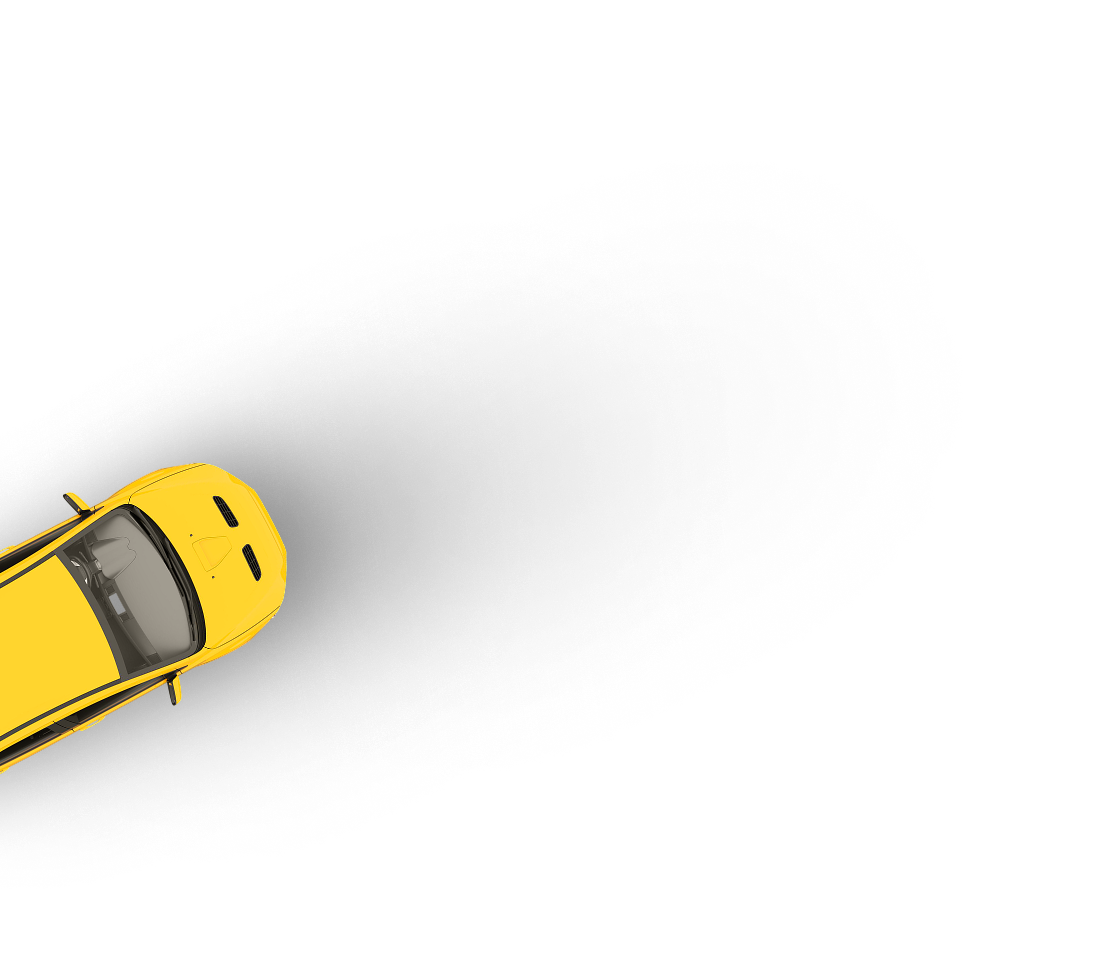Trade to trade car marketplace
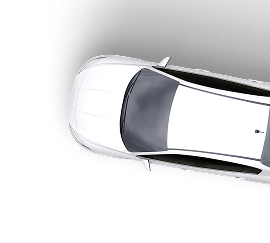
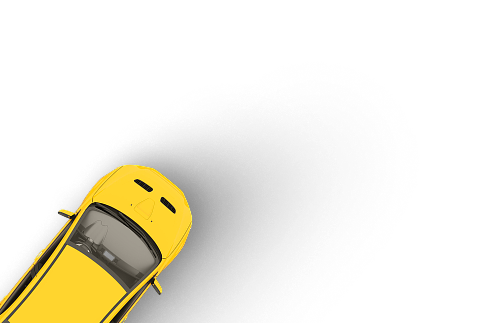
Trade-only marketplace
Flexible selling options
Maximise your profits
In this guide, we’ll break down what the law allows, when a salvage sale makes sense and how to go about it without getting stung. Whether you're offloading it privately, trading it in or selling to a breaker, here’s what you need to know.
Last updated: 4th August, 2025
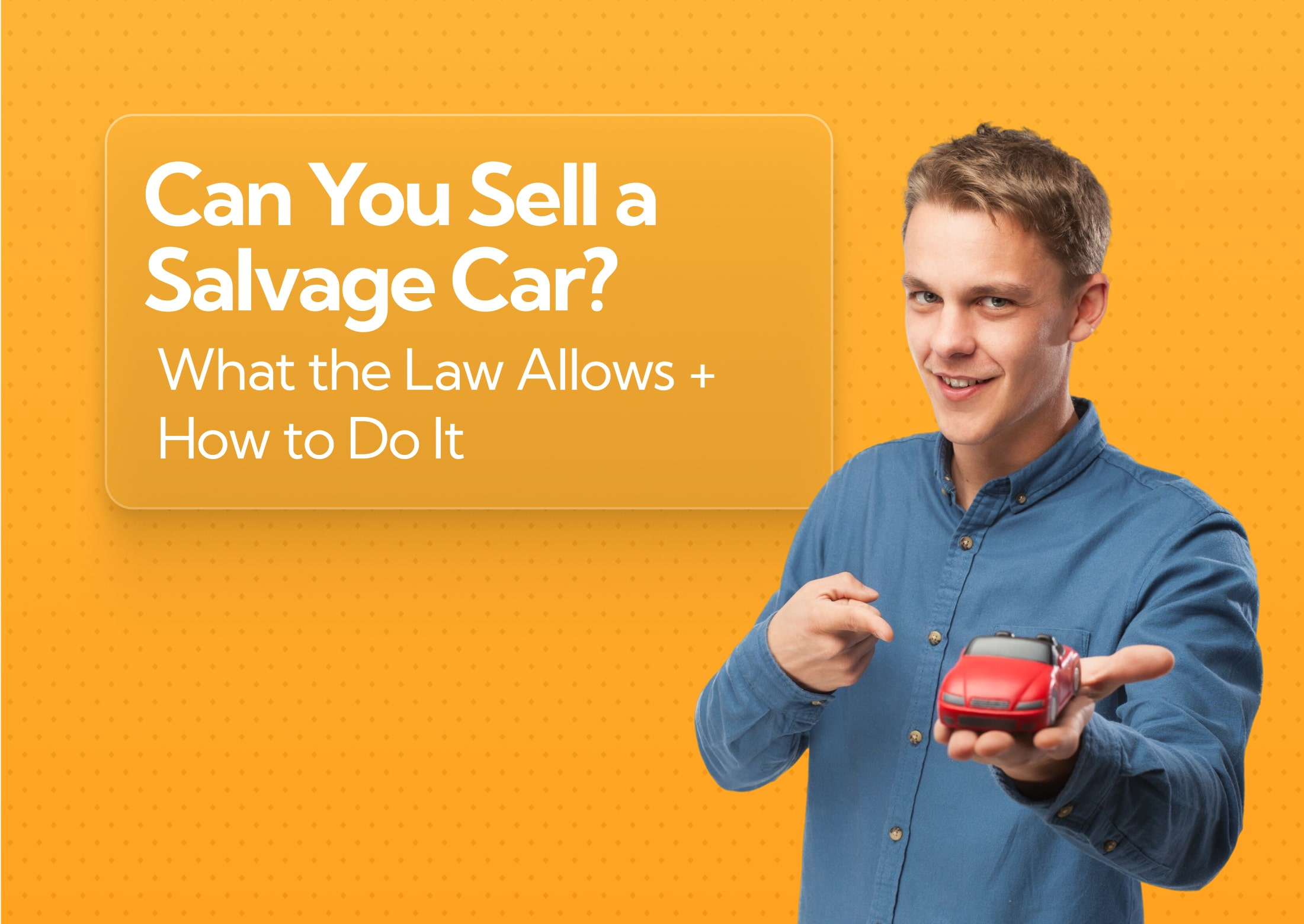
Listen to this story
‘If your car’s been written off by an insurer, you might be wondering: Can I actually sell it? The short answer is “Yes”, but there are a few important things you need to know first.
Selling a salvage car in the UK is perfectly legal, as long as it’s done properly. Whether it’s been classified as Cat A, B, S or N, there are clear rules about what you can and can’t do. Some cars can go back on the road after repairs. Others? Not a chance.
In this guide, you’ll learn when it makes sense to sell a written-off car and how exactly to go about it when you do.
A salvage car is a vehicle that’s been damaged to the point where an insurance company decides it’s not worth repairing. If fixing it after an accident, flood, fire or theft recovery doesn’t make financial sense, they’ll declare it a total loss.
When insurers assess a damaged car, they compare the cost of repairs to the car’s pre-accident value. If the repairs are too expensive or the damage affects safety, the car is “written off” and assigned a salvage category.
Here’s a quick overview of the main UK insurance write-off categories:
Just because it's written off doesn’t always mean it’s headed for the scrap heap. These three terms get thrown around a lot, but they’re not interchangeable:
In short: All salvage cars are damaged, but not all damaged cars are salvage, and scrap is salvage you can’t drive again.
Yes. Selling a salvage car is legal in the UK, but only if you follow the rules. The law draws a clear line between what you can sell and what absolutely can’t go back on the road.
If your vehicle has been given a Category S (structural damage) or Category N (non-structural damage) status, it can legally be sold either before or after it’s been repaired.
However, you’re legally required to declare the salvage status to the buyer. Selling without disclosing this could land you in legal trouble for misrepresentation. You also need to make sure the car is roadworthy (MOT-compliant) before anyone drives it again.
This is where things get strict:
Selling either of these vehicles as drivable cars is illegal. Even selling a complete Cat B shell without proper dismantling breaks DVLA and insurance regulations.
If you’re selling a salvage car, the V5C logbook (vehicle registration certificate) still plays a central role. You’ll use it to inform the DVLA when you sell the vehicle online or by post. And if you’re scrapping or dismantling it for parts, you must tell the DVLA you’re no longer the keeper and confirm it’s being broken.
Failure to notify the DVLA results in possible fines, missed tax refunds and continued legal responsibility for the car.
Before you even think about selling a salvage car, you need to know what category it’s been given. This determines what you’re legally allowed to do with the vehicle and who you can sell it to.
Category A cars are considered complete losses, usually due to extreme fire or flood damage. They’re a safety risk and must be destroyed under DVLA rules. You cannot legally sell a Cat A car, not even for parts.
Cat B cars are badly damaged (often structurally), but some parts — like wheels, interior fittings or even engines — may still be salvaged and sold. However, you cannot sell the vehicle itself as a whole, and it can never legally be driven again. The body shell must be destroyed by an authorised treatment facility (ATF).
Cat S vehicles have suffered structural damage (e.g. chassis or crumple zone), but are still roadworthy after proper repairs. These cars can legally go back on the road, but they must be repaired to a safe standard and re-registered with the DVLA.
Cat N write-offs haven’t suffered structural damage, just cosmetic or electrical issues (think bumpers, mirrors, or infotainment faults). Like Cat S, you can sell a Cat N car either before or after repairs, but you’re still legally required to disclose the write-off status.
| CHEAT SHEET for selling a salvage car | ||||
|---|---|---|---|---|
| Category | Damage type | Can you sell it? | Repairable? | Selling conditions |
| Cat A | Total loss, irreparable | ❌ No; must be crushed | No | Illegal to sell. Vehicle must be scrapped entirely. No parts may be reused. |
| Cat B | Extensive damage | ❌ No (as whole car); parts only | No | Cannot sell as a complete car. Usable parts may be sold. Shell must be destroyed. |
| Cat S | Structural damage | ✅ Yes | Yes | Must be repaired to roadworthy standard. V5C logbook must be updated. Full disclosure required. |
| Cat N | Non-structural (e.g. cosmetic, electrical) | ✅ Yes | Yes | Must disclose status to buyer. Repairs not always required but may be advisable. |
Whether you’re selling privately or to a trader, you have a legal and moral obligation to tell the buyer the car has a salvage history.
If you knowingly hide or mislead someone about a car’s salvage status, you’re breaching the Misrepresentation Act 1967. This law protects buyers from being misled, and it gives them the right to:
You could also fall foul of Trading Standards if you're selling multiple vehicles and they consider you a trader. This can happen even if you're not officially registered as one.
On top of that, keeping the car’s category quiet can result in civil claims, fines and prosecution. It's not worth the risk.
There’s no point in hiding it, because you’ll get caught by any buyer who’s even the least bit savvy. The car’s V5C logbook (registration certificate) will show a note on the first page if it’s been written off. And a cheap online vehicle history check (HPI, AutoCheck, etc.) will reveal the insurance write-off category in seconds.
In fact, honest sellers build more trust. And there are plenty of people who shop specifically for salvage vehicles, so making its history obvious will help the right kinds of buyers find your car more easily.
In listings, include the salvage category in the listing title so immediately visible from listing pages.
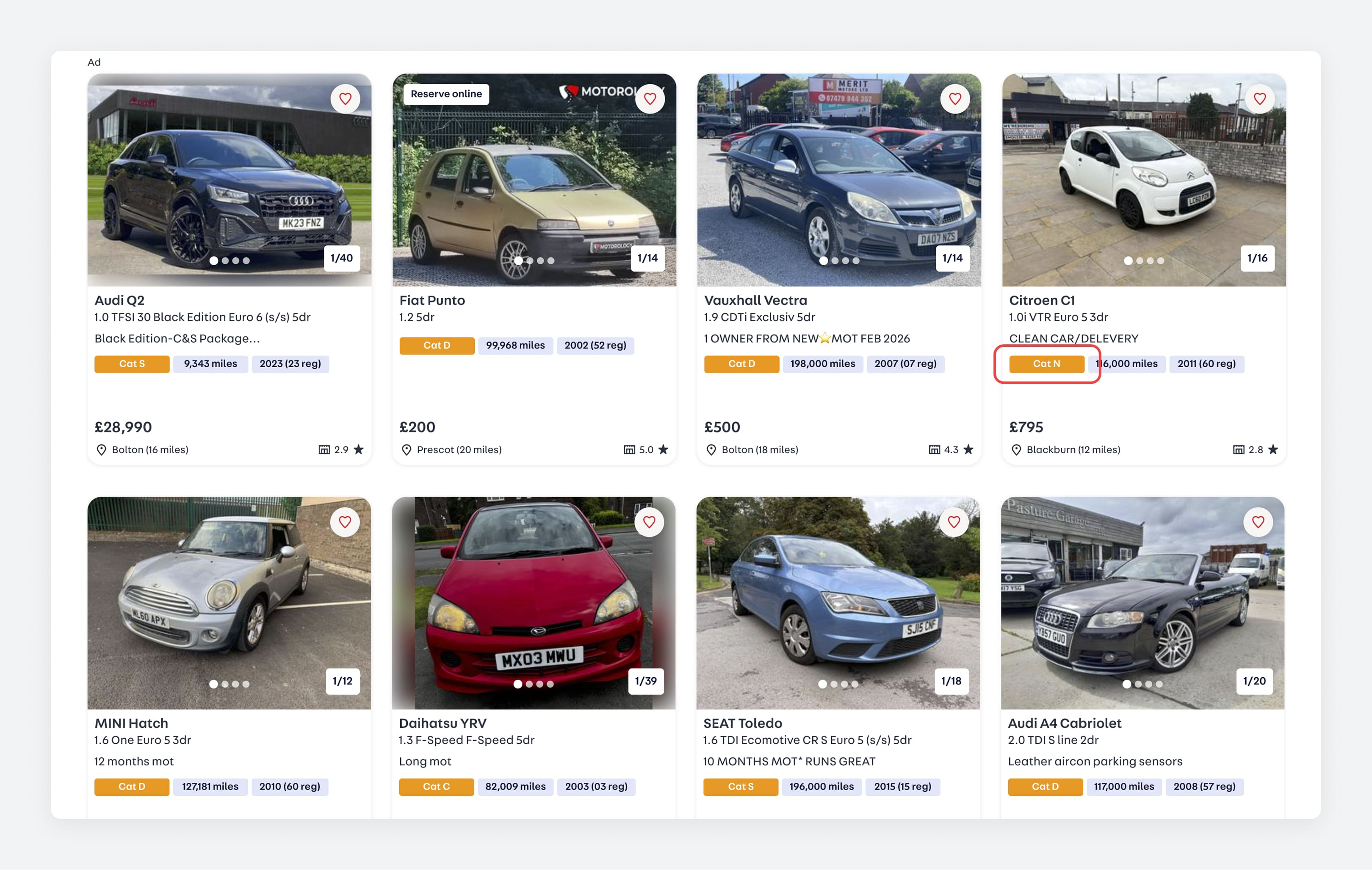
Also include the salvage category in the description, along with a quick description of the situation surrounding that write-off.
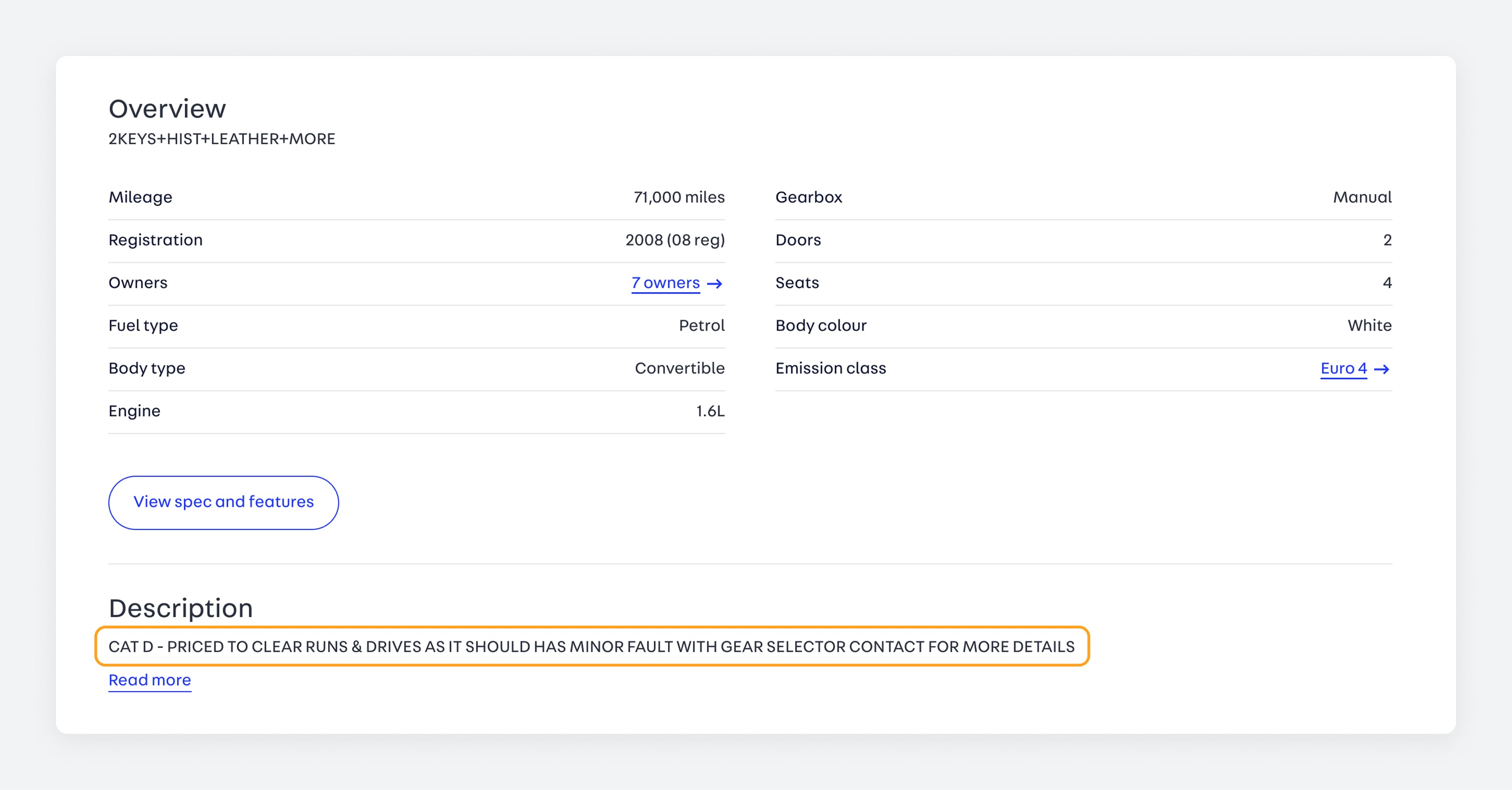
In conversations, mention the write-off status early when speaking to potential buyers, whether it’s over the phone, text or in person. And speak to the benefits, like who it’s ideal for and how great the repair work was.
If you’re looking to sell a salvage car, you might be surprised at how many types of buyers are actually interested, even for cars that seem far beyond repair. The key is knowing who’s in the market and what kind of salvage vehicle they’re after.
Some private buyers are happy to take on a Cat S or Cat N car, once it’s been repaired and is roadworthy. They’re usually looking for a good deal, meaning they’re willing to accept the salvage status in exchange for a lower price.
This crowd often goes hunting for unrepaired salvage cars, like rare models and older vehicles with classic potential. These buyers know how to source parts and do repairs themselves, and they’re usually less worried about a write-off status as long as the chassis is salvageable.
Quite a few car traders buy Cat S and Cat N cars to repair and resell at a profit. Some specialise in salvage vehicles and are set up to do the repairs in-house or via trusted garages.
Selling to a trader is normally a lot quicker than selling privately, but expect a slightly lower offer to account for their margins.
Websites like Trader.co.uk, Copart, ASM Auto Recycling, Motorway and Synetiq make it easy to sell damaged and salvage cars to a network of professional buyers. Some even collect the vehicle from your location.
These platforms are ideal if you want minimal hassle and don’t want to negotiate with individual buyers.
Some salvage vehicles, particularly Cat B or heavily damaged cars, are sold for export, particularly to countries where repair costs are lower or regulations around write-offs are more lenient.
Exporters often snap up cars that can’t be driven again in the UK but still have usable engines or body parts. You’ll often find them bidding on online auction sites or posting wanted ads.
Award-winning automotive entrepreneur, tech innovator, and founder of Car.co.uk, NewReg.co.uk & Recycling Lives.
We’re seeing strong, growing demand for salvage vehicles, especially from trade buyers and overseas exporters. Even non-runners and heavily damaged stock can hold real value if marketed to the right audience. The key is transparency. When sellers clearly list the damage, category, and any repair work, buyers are more confident and deals move quickly. That’s why platforms like ours are built for this: trusted buyers, verified listings and less friction in the sales process.
Selling a salvage car isn’t as simple as just listing it online. If you want to get a fair price (and avoid legal headaches), you’ll need to do a bit of groundwork first.
Whether the car’s been repaired or not, a professional assessment adds credibility. An inspection confirms the current condition of the car, identifies any lingering safety or mechanical issues and reassures buyers you’re not hiding anything.
You can go to a local mechanic, body shop or independent inspection service. If the car has been repaired, include a recent MOT certificate and the receipts from repair garages.
Before listing the car, make sure you have all the relevant paperwork:
Don’t try to hide dents, scrapes, or replaced panels, show them. Take well-lit, high-resolution photos of the following:
This shows good faith and saves time answering buyer questions. If you’ve got “before” pictures, those can help demonstrate what’s been fixed.
Depending on the car’s condition and category, you’ve got options:
If you’re a trader, you can list your car on our trader-only platform. All you have to do is sign up (it’s free!).
If you want maximum value with minimal hassle, Trader.co.uk is the best option. It’s a trader-only marketplace, meaning you’re selling directly to thousands of verified professional buyers — no tyre-kickers, no time-wasters.
You can list your car for trade-only auctions or direct sales, and the platform’s AI-driven tools help you get the best price quickly. Because every buyer is pre-approved through our application system, it’s a safer and more trustworthy environment than public classifieds.

If you want maximum value with minimal hassle, Trader.co.uk is the best option. It’s a trader-only marketplace, meaning you’re selling directly to thousands of verified professional buyers — no tyre-kickers, no time-wasters.
You can list your car for trade-only auctions or direct sales, and the platform’s AI-driven tools help you get the best price quickly. Because every buyer is pre-approved through our application system, it’s a safer and more trustworthy environment than public classifieds.
Copart is one of the UK’s largest salvage vehicle auction platforms. It’s trusted by insurers, dismantlers, body shops, scrap metal recyclers, exporters and individual buyers alike, and is ideal for unrepaired or severely damaged cars.
You’ll need to register, but once you're in, you can list your vehicle and have it picked up for auction. It’s particularly good for Cat B or high-damage Cat S cars.
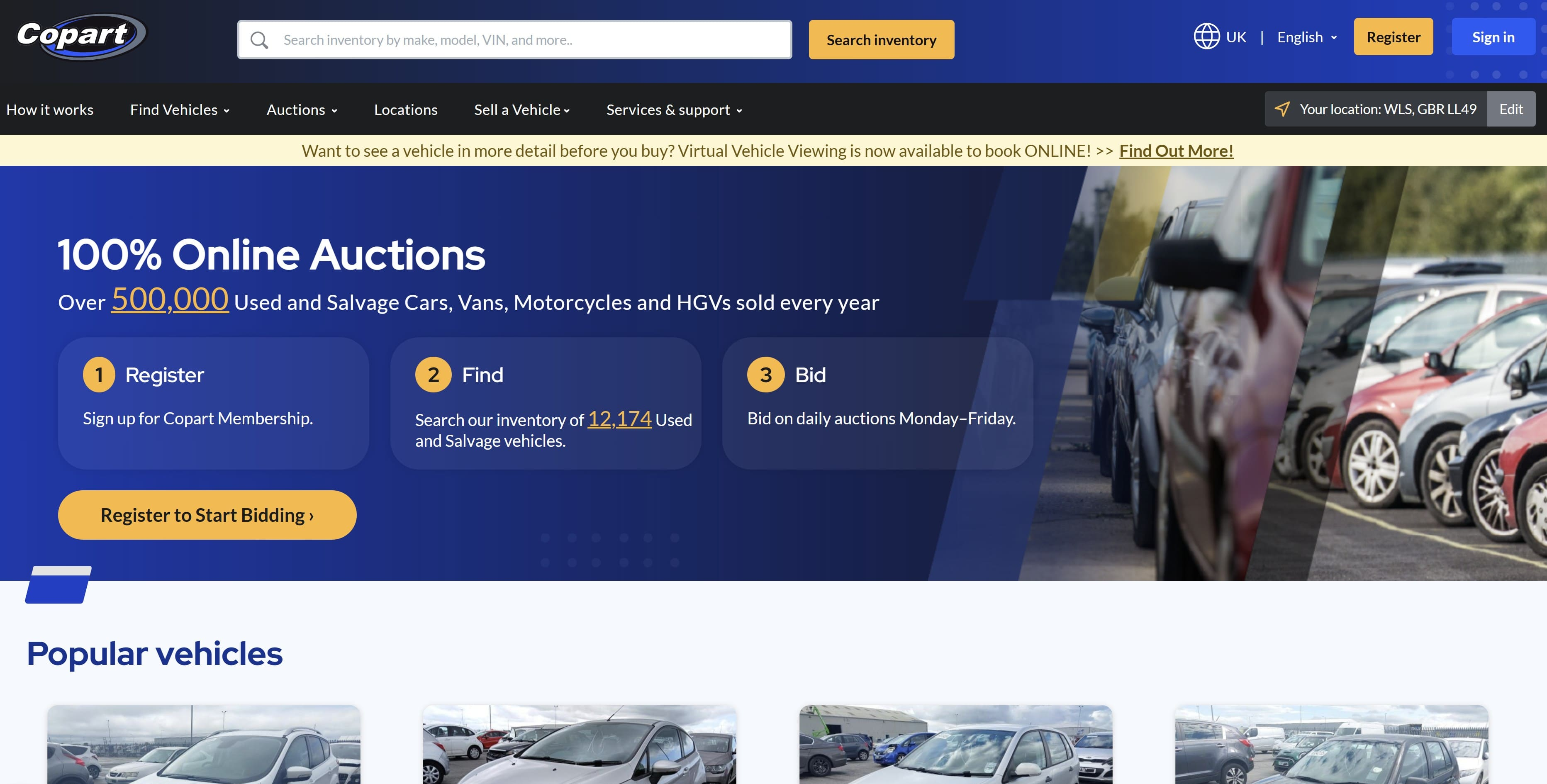
ASM buys salvage and scrap cars directly, and also hosts online auctions for trade buyers. You can request a quote or list your car for bidding. They also offer collection services and can handle DVLA paperwork for you.
Ideal for sellers who want a hands-off experience or don’t want to deal with buyers directly.
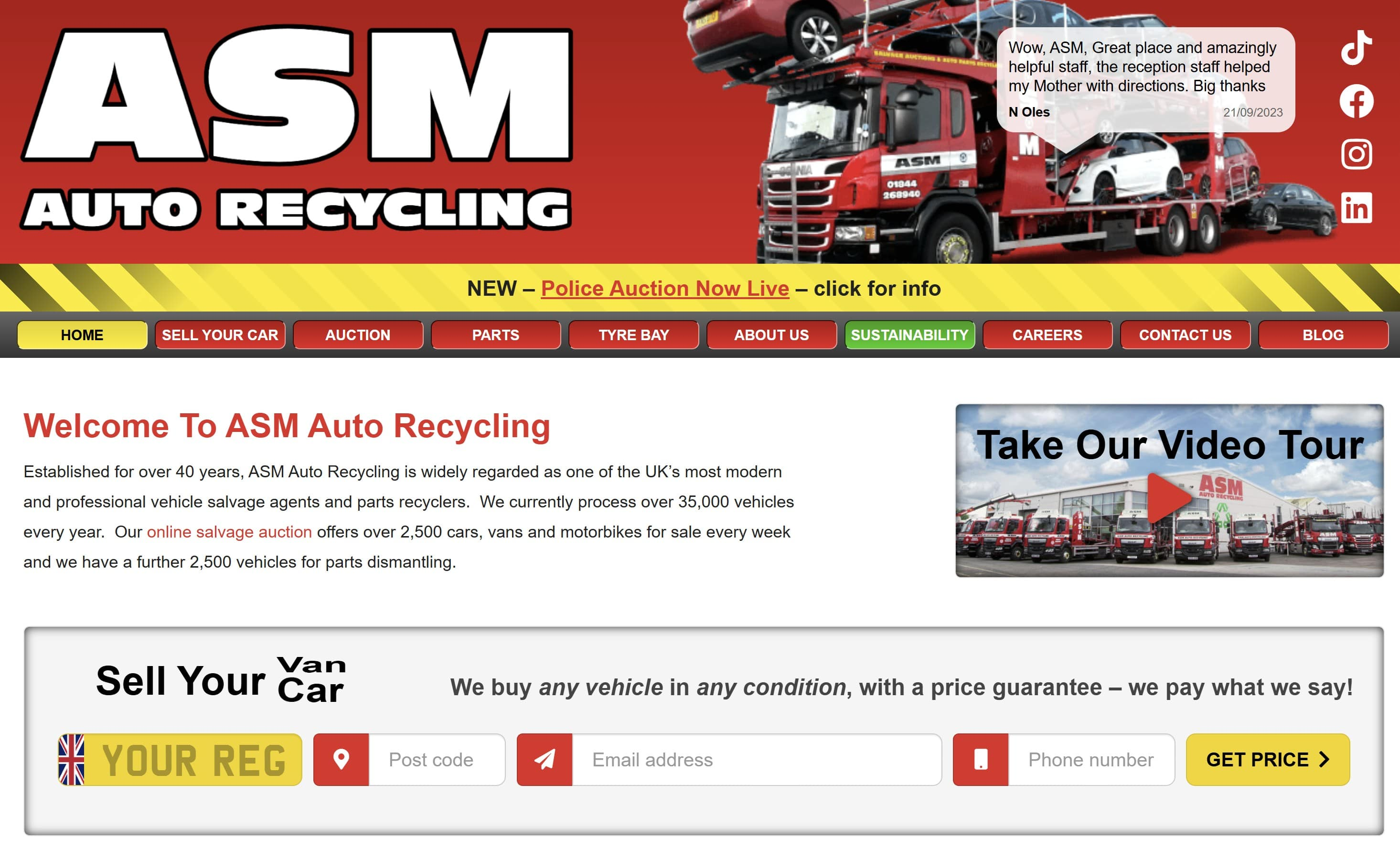
While it’s best known for standard used cars, Motorway also accepts certain salvage vehicles, especially Cat N and some Cat S if they’ve been repaired.
They connect you with verified dealers who bid on your vehicle, and collection is arranged once a deal is agreed. A good option if your salvage car is in decent condition and roadworthy.
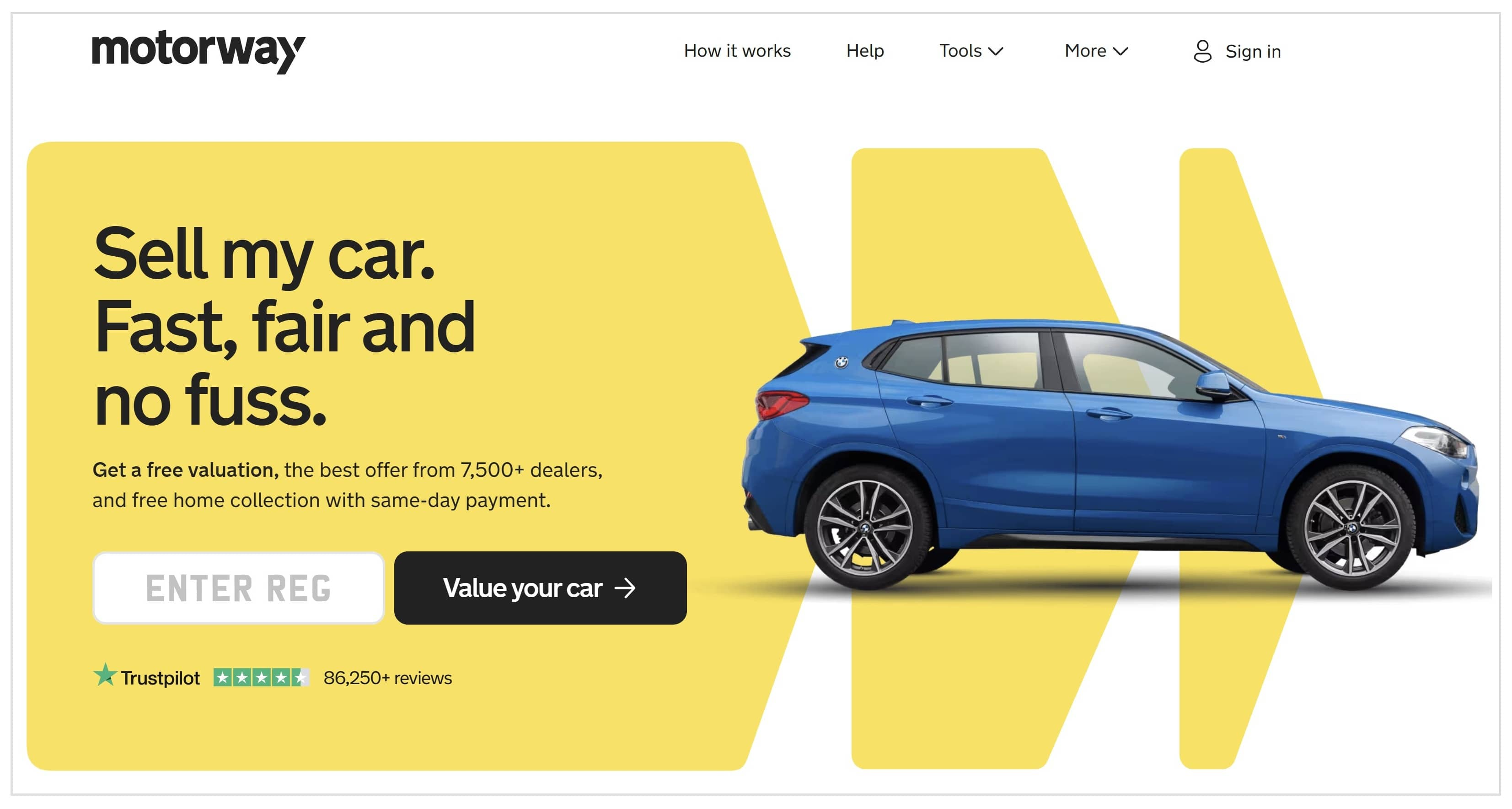
Open marketplaces like eBay, Facebook Marketplace and Gumtree offer access to a wide range of private buyers and car enthusiasts. They’re fantastic for selling repaired Cat S or Cat N vehicles where you can show work done and discuss the history.
But be cautious: these platforms come with higher risk of time-wasters and scammers, so take extra care vetting buyers and avoid sharing too much personal info.
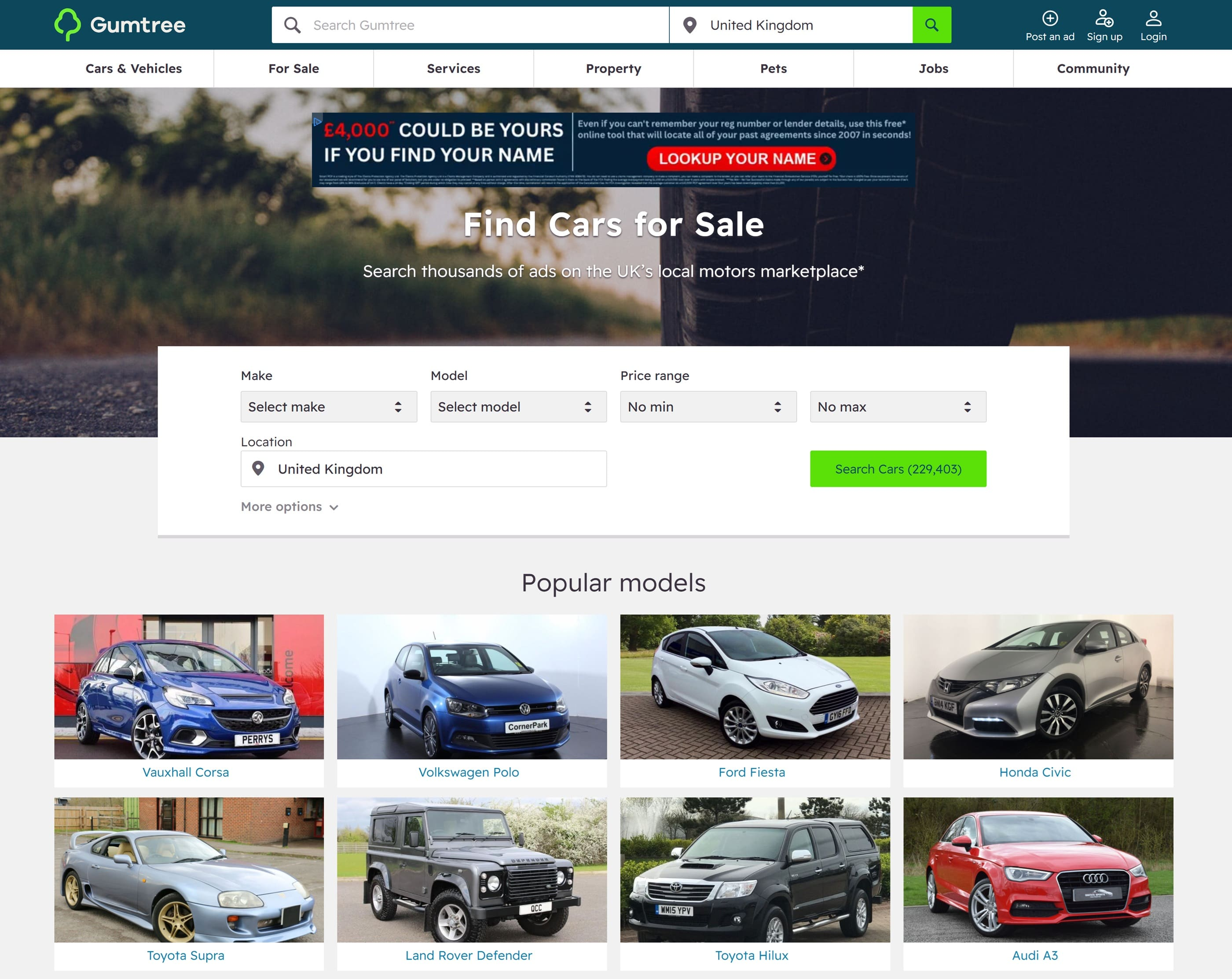
Salvage cars don’t follow the same pricing rules as regular used vehicles. The write-off status alone knocks a chunk off the market value. Doesn’t matter if the car’s been fully repaired. But that doesn’t mean you should settle for a lowball offer.
Buyers tend to be cautious with any car that’s been written off. A Cat S or Cat N car that’s been professionally repaired might still lose 20-40% of its original market value, purely because of its record.
If it’s unrepaired, the price drop can potentially be even steeper, often 50% or more depending on damage and repair costs.
You’ll have to factor in the category.
This plays a huge role because it speaks to how well your car will perform on the road (or if it’s even allowed to go back on).


Even with a salvage title, buyers still care about the usual things:
A well-repaired Cat N car with low miles will be worth far more than a high-mileage Cat S with questionable fixes.
Start by checking what your car would be worth without the salvage title using valuation tools like…
…or by checking online listing sites.
Then subtract 20–50% based on damage, repairs, and salvage category.
Yes, you can sell a salvage car to a dealer or use it as part exchange, but your options will depend heavily on the car’s condition and its insurance category.
Dealers will typically only accept Cat S and Cat N cars. Most reputable ones won’t touch Cat A or Cat B vehicles because they’re not road legal and can’t be sold on. Even with Cat S or N, many dealers are cautious.
You can also offer your salvage car as a part exchange when buying a new or used vehicle. Some dealerships may:
If a traditional dealership turns you down, try selling to specialist salvage dealers, online platforms like Trader.co.uk or Copart and car buyers who regularly deal in Cat S/N stock. Buyers who know the salvage market inside out are far more likely to give you a fair, no-hassle offer.
Yes, exporting a salvage car from the UK is legal. And for write-offs that are beyond repair domestically, it can actually be the most profitable route.
The reason is simple: Cars that aren’t worth fixing in the UK due to high labour or parts costs may still hold significant value overseas, where regulations are looser and repairs are cheaper. That’s why a large number of Cat B and unrepaired Cat S vehicles end up in international markets.
To stay on the right side of the law, make sure you follow these key steps:
There are four main problems you might run into when you’re trying to export your car abroad:
To avoid these, always verify buyers and get deposits upfront. And if you’re a trader who plans to work extensively in international markets, hire local experts who can save you from being taken advantage of or getting in trouble for noncompliance.
Tax, insurance and legal responsibilities before selling
Before you hand over the keys to a salvage car, make sure you've tied up the legal loose ends. This goes for any vehicle, but selling a written-off vehicle comes with a few extra responsibilities.
Even if your salvage car doesn’t start, doesn’t move, or looks like it’s been through a war zone, you can still sell it. You just need to aim it at the right kind of buyer.
If the car won’t start or is clearly not roadworthy, you won’t get far with private buyers or part-exchange at a dealership. Most everyday buyers are looking for something they can drive away, not a project or parts donor.
There’s still a strong market for salvage vehicles in rough condition — especially if you’re upfront about what works and what doesn’t. Here’s who to target:
If you’ve got the time, space, and basic tools, you could get more money breaking the car yourself and selling it piece by piece. In-demand parts like engines, gearboxes, lights, alloys and interior fittings might add up to more than you’d get scrapping it or selling the non-running car whole.
Fundamentally speaking, selling a salvage car isn’t hard. Cut corners or skip key steps, though, and it’ll come back to bite you.
Here are the most common (and costly) mistakes people make:
If you know the vehicle has been written off and you deliberately fail to mention it or lie when asked, you could be guilty of misrepresentation under UK law.
While private individuals aren’t held to the same standards as businesses, you must still answer honestly if asked directly whether the car has ever been written off. You cannot knowingly mislead the buyer or deliberately leave out this key information, or the buyer can sue you.
Dealers and motor traders are held to a much stricter legal standard under the Consumer Protection from Unfair Trading Regulations 2008.
Selling a salvage car in the UK isn’t as complicated as it might seem as long as you follow the rules. No matter if your car’s lightly damaged or completely written off, there’s almost always a buyer out there. You just need to be transparent, realistic, and smart about where and how you sell it.
Disclose everything honestly and early, know your category, use the right platform, handle the paperwork and don’t cut any corners, and you’ll stay on the right side of the law.
Yes, you can sell a Cat S car without repairing it. But no, it can’t legally be driven.
A Category S car has structural damage, which means it’s not roadworthy until repaired to a safe standard and re-registered with the DVLA. So while you’re allowed to sell it in its damaged state, the buyer will need to transport it (via trailer or recovery truck), not drive it home.
Yes, you can legally sell a salvage car without a valid MOT. But just like with unrepaired Cat S or Cat N cars, it cannot be driven on public roads until it passes one. The buyer will need to arrange transport to collect the vehicle.
Yes — you’re legally required to inform the DVLA when you sell, scrap, or export a salvage car. Failing to do so means you could remain on record as the registered keeper, leaving you liable for road tax, speeding and parking fines, insurance claims, and SORN issues.
In general, salvage cars don’t sell as quickly as undamaged, clean-title vehicles. Most buyers are cautious about write-offs, even more so if repairs haven’t been done or there’s no documentation.
That said, some write-offs do sell quickly. If they’re in-demand models (common vans, 4x4s, hybrids), the damage is clearly documented and minor (Cat N, light repairs), the price is realistic, you’re using the right platform and your listing is optimized, your car will sell a lot faster.

